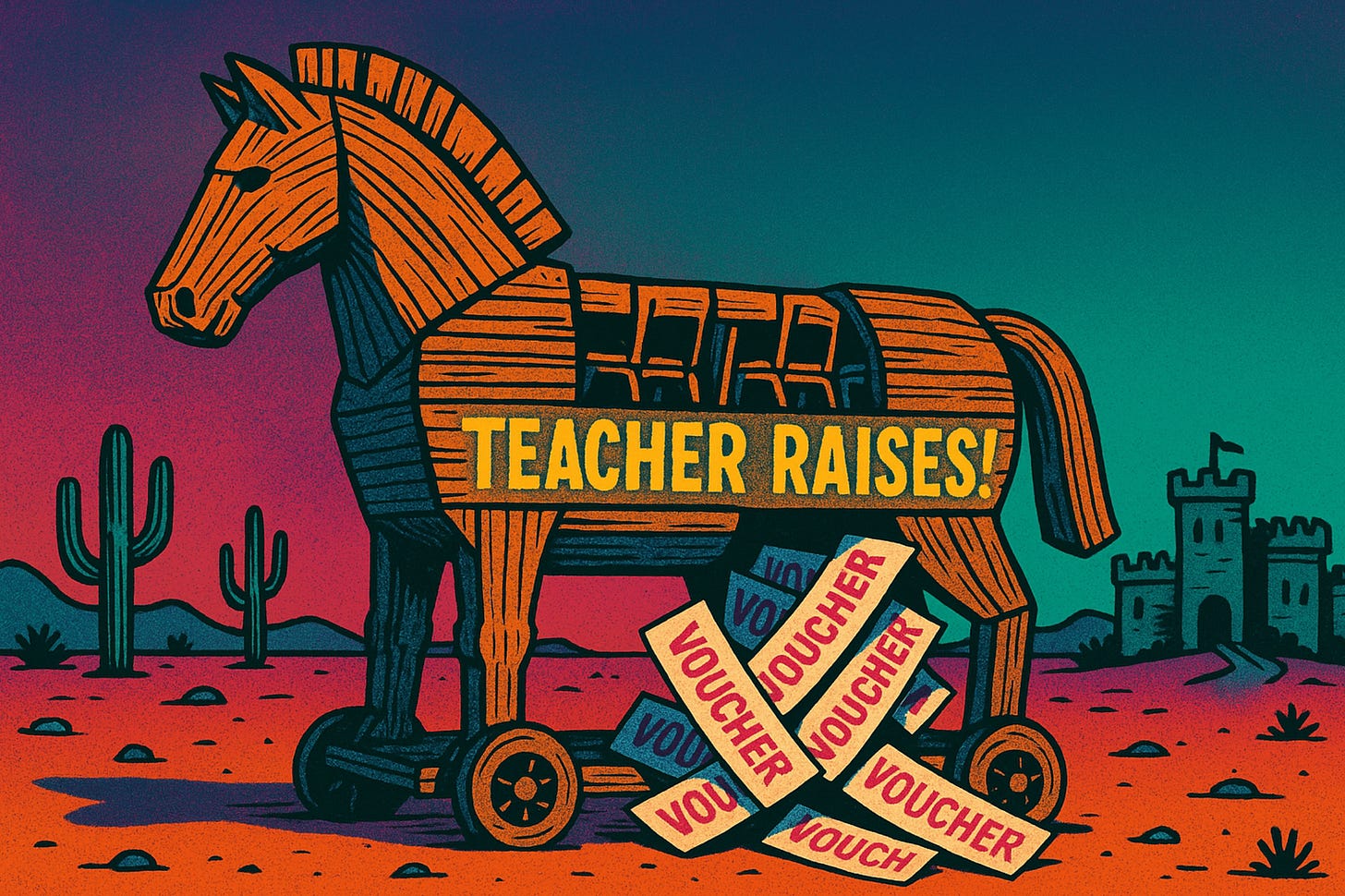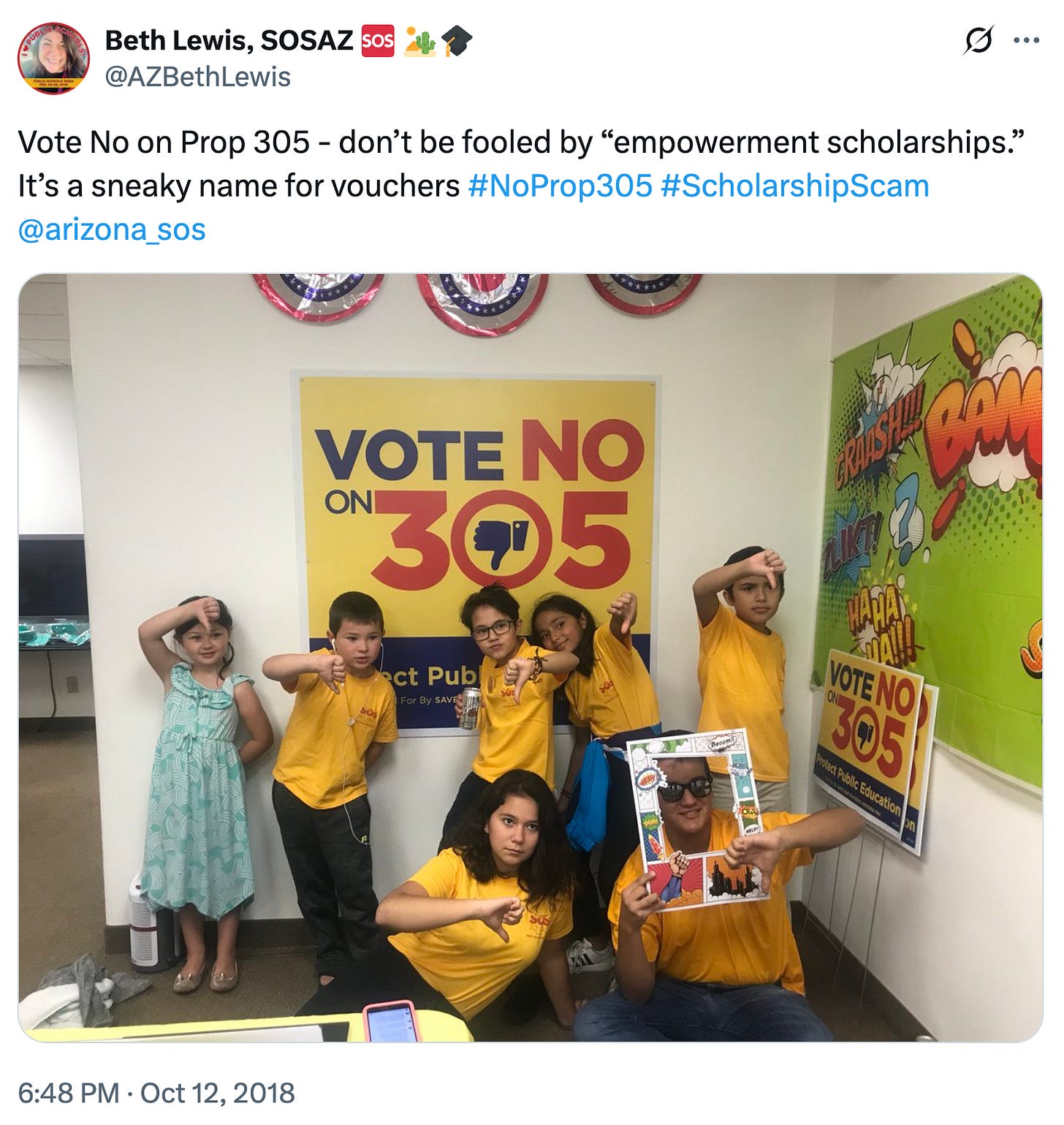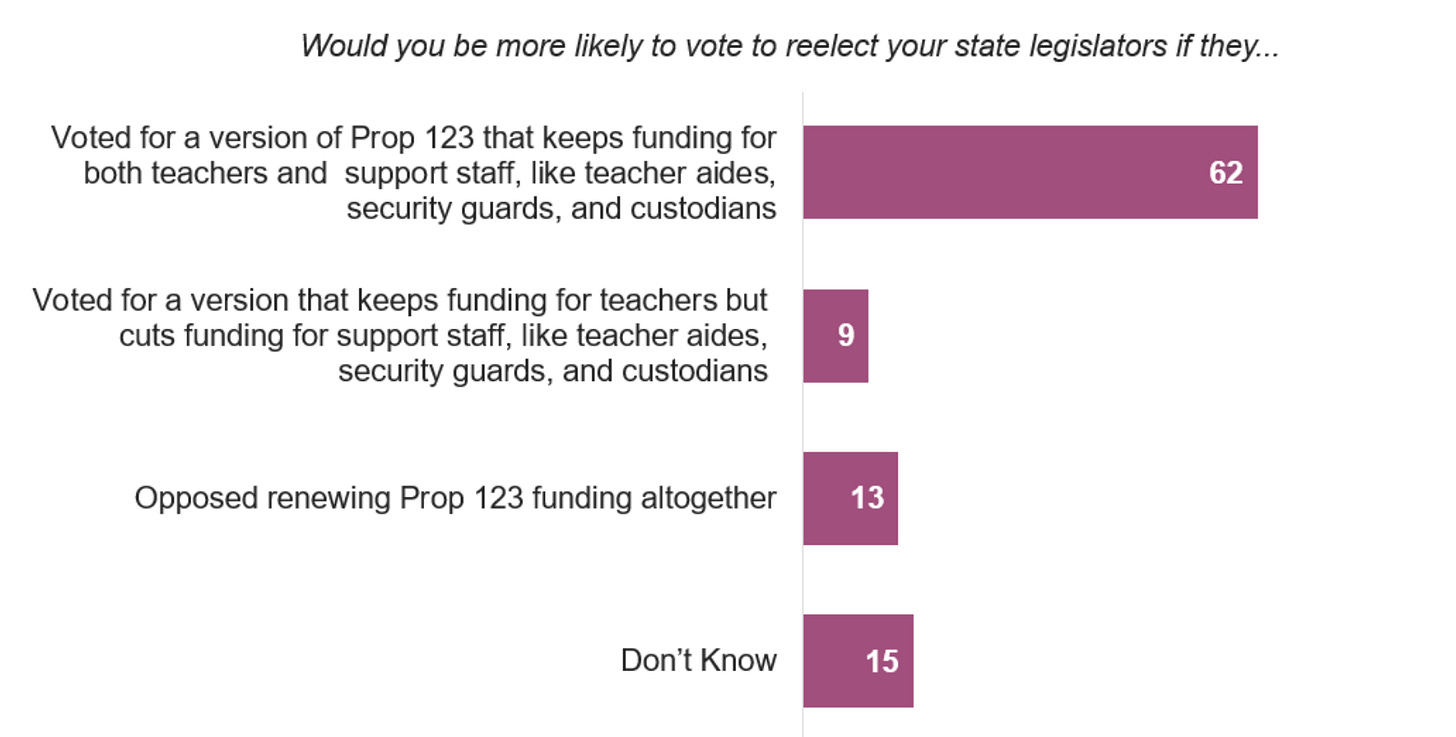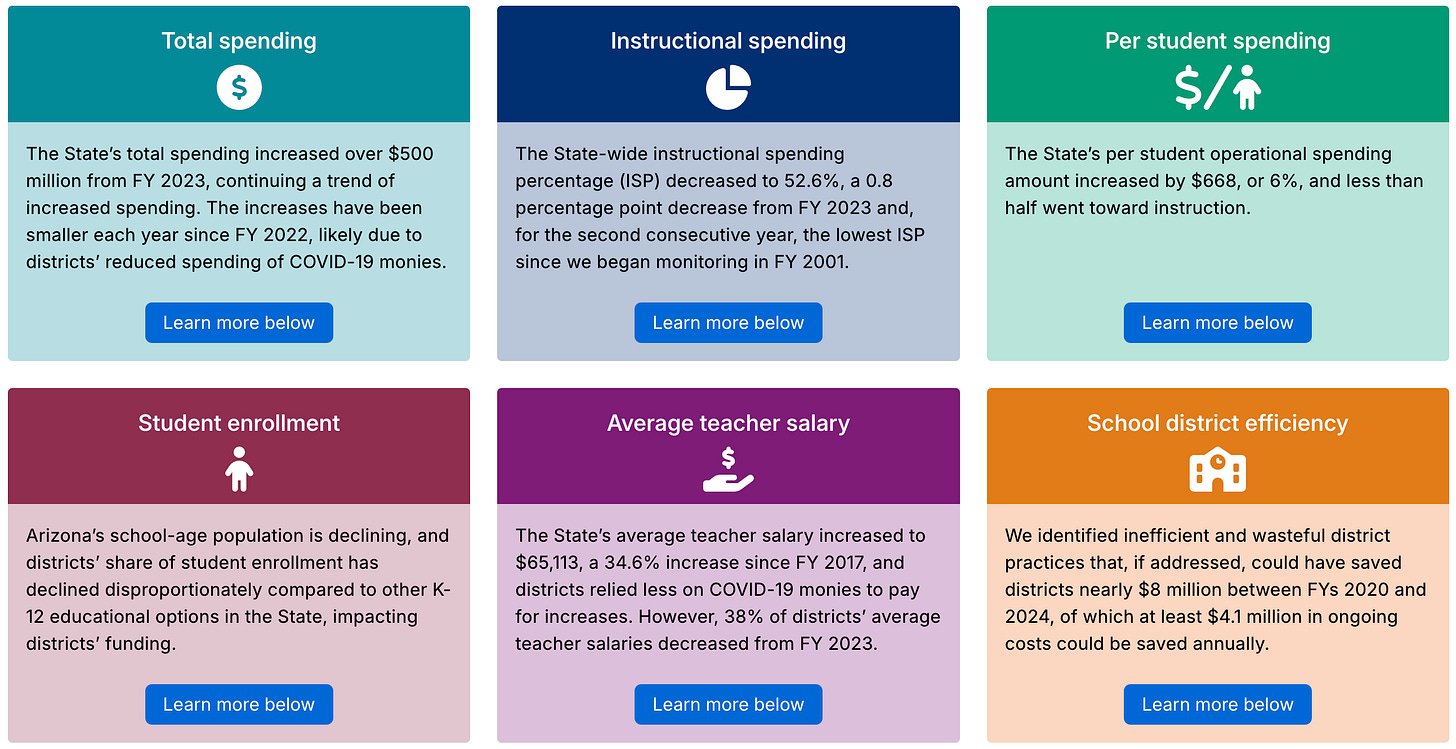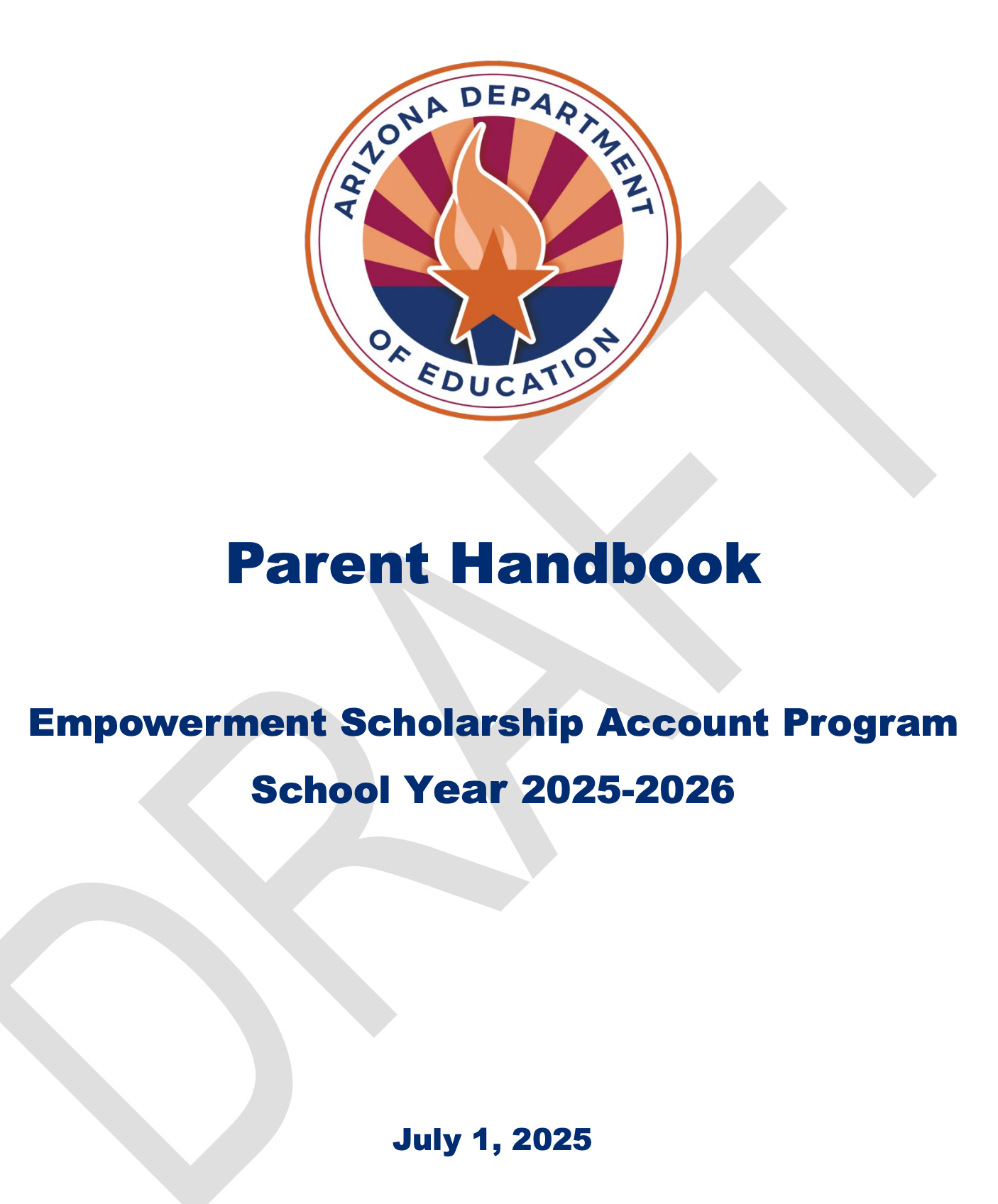Prop 123: Now with vouchers!
There’s always a catch … We love a good dashboard … And put ‘em all on (mock) trial.
Republican lawmakers want to permanently cement school vouchers in the state Constitution by tying them to the renewal of Prop 123 — betting that voters won't turn down the cash, no matter what strings they attach.
The long dormant battle over whether to renew and extend Prop 123 — the $300 million per year school funding stream that's about to run dry — got a new life and a twist this week when Republican lawmakers started shopping their plan to add protections for Empowerment Scholarship Accounts into the text of their Prop 123 renewal plan.
The deal is still not settled and the plan hasn’t been made public, but several stakeholders, including a key Republican lawmaker, confirmed that Republicans will hitch a voucher protection amendment to the Prop 123 renewal bills that have languished at the Legislature.
A vote could come as early as next week, and supporters expect the voucher/ESA mashup to pass on party-line votes.
Because it’s a constitutional amendment, the governor can’t veto it.
If lawmakers approve the policy, it will go directly to the voters on their ballot, likely at the November 2026 election.
“There is a significant interest among Republicans to raise teacher pay and also protect all the school choice options we have right now,” one Republican lawmaker privy to negotiations told us. “(Gov. Katie) Hobbs says (protecting vouchers is) a red line. But she doesn't get to control any of this process. … We'll let the voters decide.”
Combining the two ideas will blow up the coalition of business conservative groups and education organizations that helped narrowly usher the original Prop 123 across the finish line in 2016. The Arizona Education Association is hip to lawmakers’ plans, and said they will actively oppose any efforts to tie voucher protections to school funding.
"This is a bastardized version of Prop 123 that should be dead on arrival," Marisol Garcia, President of the Arizona Education Association, said. "A decade ago, Arizona voters from all political backgrounds came together to make a historic investment in our schools (via Prop 123). We're not going to let anybody hold that progress hostage to protect their out-of-control voucher scam."
Voters want a clean renewal of Prop 123, the AEA argues, pointing to their recent polling showing voters prefer a version that continues the flexibility to pay other support staff instead of just classroom instructors.
Adding protections for school vouchers into the mix also ensures that education groups like the AEA and others won’t kick in to support the campaign, which will cost millions.
No matter, the Republican said, noting that because Arizona is a national leader in the school voucher movement, they expect conservative donors from across the nation to help fund the campaign.
“Several major donors are ready to step up to the plate because they care about paying teachers more and our school choice option,” the Republican said.
Voters barely approved the original Prop 123 back in 2016 — even though there was no real organized opposition to the idea.1
But the teachers’ union and other education groups have the resources to whip up an effective “no” campaign, potentially killing $300 million in annual revenue for schools in order to head off constitutional protections for Arizona’s voucher system.
And as opponents of the voucher system are quick to note, voters have already rejected Arizona’s universal voucher system once. In 2018, organizers gathered more than 100,000 signatures from voters to send the law to the ballot for a “citizen veto.”
Tyler Kowch, the communications manager for Save our Schools Arizona, which organized to kill the first voucher expansion, said they’ve also heard about the new plan to “shoehorn vouchers into any agreement — which is frankly ridiculous.”
“When Prop 123 was passed, it was a bipartisan agreement to fund our public schools. When Prop 123 returns to the ballot, it needs to once again be a bipartisan agreement. Including universal vouchers, which were rejected by Arizona voters 2-1 in 2018, is a nonstarter,” he said.
PROP 123
On the Prop 123 side, Republicans are eyeing a 10-year extension of the current 6.9% draw from the state land trust.
But the GOP proposal would change the formula for how schools receive the funding. Instead of basing a school’s distribution on its student enrollment numbers and allowing schools to spend the money more or less as they see fit, the money would be specifically dedicated to boosting the salaries of in-classroom teachers.
In that sense, it hews closely to the current proposal that Republicans have put forward, which they way will provide a $4,000 salary boost to every classroom teacher in the state.
Most school districts enacted Prop 123 as a percentage raise, the lawmaker noted, and that led to senior teachers getting a larger boost than new teachers.
Structuring it as an equal raise to all teachers will ensure new teachers receive larger raises as a percent of their salaries. And that in turn will help keep those critical younger teachers in the classroom, the lawmaker said.
In order to qualify, teachers would need to spend most of their time in a classroom, and would need to be deemed “performing” under a yet-to-be-determined metric.
Under the Republican plan, the 6.9% distribution rate would last for another 10 years, after which the distribution rate would drop — but not all the way back to the 2.5% that it would be if Prop 123 simply expires.
That’s a far cry from the plan that Hobbs has proposed.
Hobbs and legislative Democrats generally want to increase the distribution rate above the current 6.9%, and ensure the money can also be spent on support staff like student teachers and bus drivers.
Extra Credit
If you want to really dig into state budget numbers for education, the Arizona Auditor General put together a nice dashboard for the public.
That dashboard will come in handy over the next few weeks as state officials and lawmakers argue over how schools spend their money.
The auditor general has tracked school spending since 2001, so you can really get a feel for how spending has gone up and down over the long-term.
You also can track how much money is spent in classrooms and how much is spent per-student, as well as trends in enrollment and dozens of other topics.
But beware, state law directs the auditor general to report on spending in public school districts, but not charters.
That’s one dark cloud: The president of the Phoenix Elementary School District Governing Board resigned last week after facing public criticism for using her house as collateral to bail out a man who later pleaded guilty to attempted child sex trafficking, 12News’ Kevin Reagan reports. Jessica Bueno said she was ”helping out a friend in need,” Phoenix New Times’ Morgan Fischer reported earlier this month.
Pulling the plug: Plans to build a seminary at a school in Vail fell through after public criticism over the separation of church and state, KGUN’s Walter Reinke reported. The Vail Unified School District Governing Boarded decided in March to let the Church of Jesus Christ of Latter-day Saints build a seminary on the Cienega High School campus. But critics said it wasn’t appropriate for a religious institution to operate at a public school, with the nonprofit Secular AZ leading the way. Church officials said they were grateful for the effort by the school district, but they were calling off the plan, the Republic’s Wren Smetana reported.
"This is a public high school, not a platform for religious proselytizing. We had to act ― and we did,” Dianne Post, legal director for Secular AZ, told the Republic.
Parental pushback: State officials pushed back the vote to approve the handbook for using school vouchers after parents clamored to get rid of spending caps, among other issues, KTAR’s Shira Tanzer reports. The new date for the vote is June 23, which state officials said would give the public time to share their opinions on the Empowerment Scholarship Account program.
Pick one or the other: Republican state lawmakers want to force public school districts to let private school students on their sports teams as an equal-access measure, but the legislation could cause public school kids to lose out on spots on their own schools’ teams, Capitol Media Service’s Bob Christie reports. The bill requires private school students to live in the public school’s boundaries, pay any required fees and to have passing grades. It’s awaiting House approval.
Protest pushback: The Arizona Senate approved a bill that would block protesters from setting up encampments on college campuses, KJZZ’s Greg Hahne reported. The bill was spurred by pro-Palestine protesters who set up camp on the campuses of the University of Arizona and Arizona State University last year. Tucson Democratic Rep. Alma Hernandez sponsored the bill, saying the encampments were breeding grounds for antisemitism. Opponents of the bill are pointing to First Amendment challenges that are likely to come.
Becoming a master: Arizona students looking to get an apprenticeship just got a $1 million boost. The Arizona Office of Economic Opportunity and Gov. Katie Hobbs’ BuildItAZ Apprenticeship Initiative announced the funding last week. The initiative has helped 3,000 Arizonans get apprenticeships in construction and trades, KTAR’s Roxanne De La Rosa reports. One goal is to create more opportunities for women in the construction and trades.
We’d love a $1 million boost to cover education in Arizona. But we’d be happy with just a few bucks from our subscribers.
Education pays: The Superintendent of the West Valley’s Tolleson Union High School District, Jeremy Calles, earns nearly $500,000 per year, including his potential bonus pay and stipends, State 48 News reports. That’s by far the highest base pay and highest performance bonus pay of the superintendents in the dozen large districts the news organization reviewed. Calles also recently won a $450,000 settlement from the district over his allegations that Democratic state lawmaker (and former Tolleson school board member) Elda Luna-Nájera sexually harassed him.
Funding woes: University of Arizona researchers are crying foul after the National Institutes of Health said anyone who wants a grant must disavow DEI and cannot disinvestment from Israel, the Arizona Daily Star’s Prerana Sannappanavar reports. A long list of high-profile faculty at the University of Arizona are asking school leaders to push back against the Trump administration’s efforts to control universities. They’re worried about funding cuts, “unlawful” strings attached to grants, and international students and scholars who are “living in fear of deportation.”
Next week, high school kids from across the country will head to Phoenix for the 2025 National High School Mock Trial Championship.
It’s a way for students to practice being attorneys, before they decide whether they want to actually become practicing attorneys.
And for you journalism buffs out there, the case they’re trying is the assassination of Republic reporter Don Bolles in 1976.
They’ll argue their cases in real courthouses in downtown Phoenix, which sounds pretty cool.
Good luck! And don’t forget to yell out “objection!” as many times as you can.
And back in 2016, education funding was a top-of-mind issue — this was just before the #RedforEd movement. As we noted in a previous edition, polling shows that education funding isn’t exactly voters’ top concern these days.




